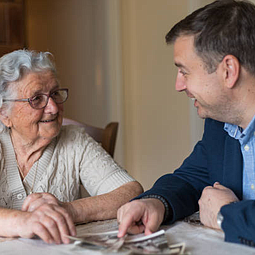Memory Loss and the Midlife Couple
September 22, 2014 at 6:00 a.m.
The last thing we expected when we found each other was that our journey would include Alzheimer’s Disease. Jennifer was 52 and Charles was 59 when we met, and he was healthy, active, and sharp as a tack. He had gone back to college and earned his bachelor’s degree at age 52, and was working in the computer science field.
Over time, we began to notice that Charles was having some memory problems – but then, so was Jennifer and just about everybody we knew over the age of 50. As time went on, we became more and more concerned. Charles was initially diagnosed with Mild Cognitive Impairment, which we were told might or might not progress to Alzheimer’s. Sadly, it has.
We learned that one in nine people over the age of 65 has Alzheimer’s, and that more than a third of people 85 and older have this diagnosis. If you are embarking on a midlife relationship, memory loss from Alzheimer’s and other conditions is a very real possibility for either partner. We know this is scary, and that most people don’t want to even think about losing their memory, but avoiding the problem won’t make it go away.
There are some things you can do to help keep your memory as vital as possible, regardless of whether or not you have a memory disorder. They are:
- Physical activity – this has been shown to improve brain health; weight loss is also helpful
- Social interaction – work, volunteering, and visiting with family and friends are all important
- Mental challenge – learning a new, complex skill such as a language or learning to play a musical instrument is helpful; even activities such as crossword puzzles or Sudoku may stimulate the brain
Older people suffer memory impairment from a variety of causes, including strokes, heart disease, and neurological disorders other than Alzheimer’s. This can cause a strain on the relationship, and there are no easy answers. The person with memory loss is often frustrated and may have difficulty communicating even in the earlier stages. The “care partner” (a phrase we learned from the Alzheimer’s Association and we like better than “caregiver”) is under immeasurable stress and needs to have robust support systems in place.
There may be some particular complicating factors when memory loss occurs in a relationship that began in or after midlife. If the care partner’s relationship with the partner’s children or other family members is not strong, he or she may feel isolated in providing care and support. There are significant financial costs associated with any long-term illness, and this can create stress or family conflict.
Both the care partner and the person with memory impairment may feel a strong sense of grief and loss, not only for what they had, but also for what they hoped to have in their life together. Our dreams of walking into the sunset hand-in-hand with our midlife partner must undergo quite a bit of modification. Daily life becomes a challenge, as the capability of the person with memory loss is a moving target. Sometimes the care partner underestimates the person’s ability and does too much; sometimes, he or she doesn’t realize just how much help the partner needs.





